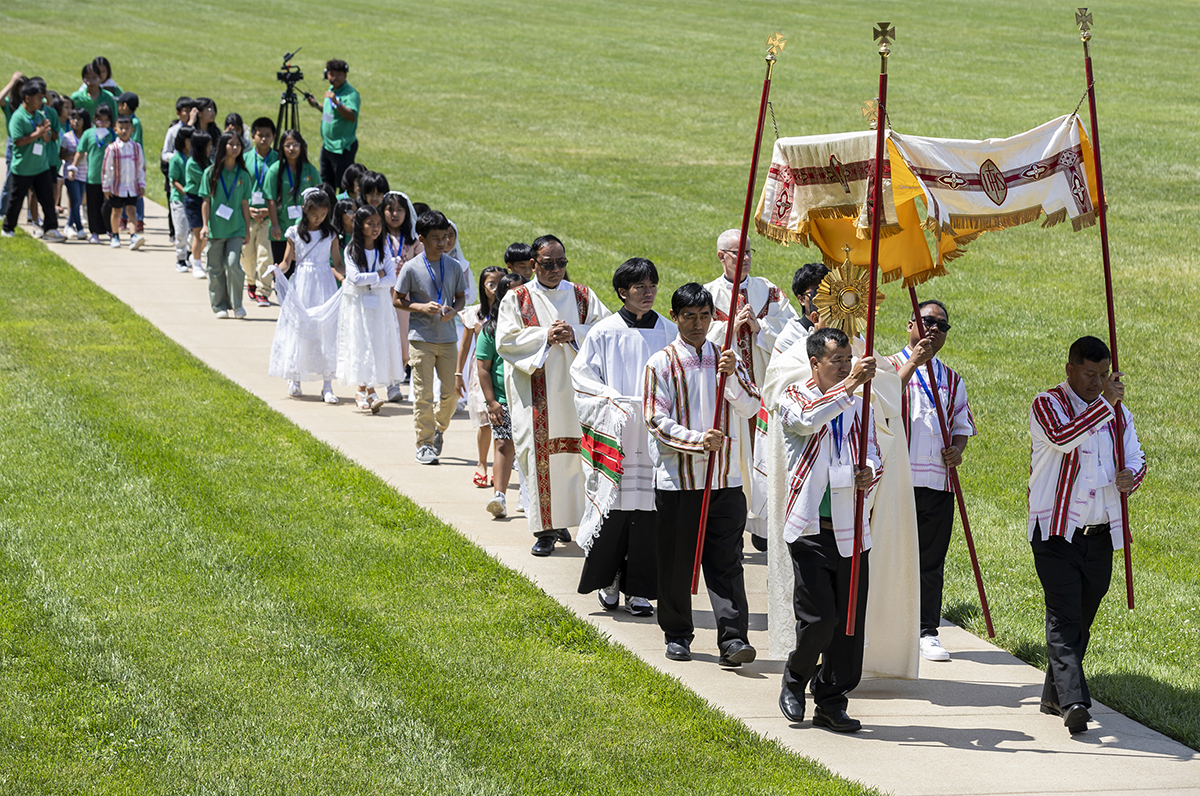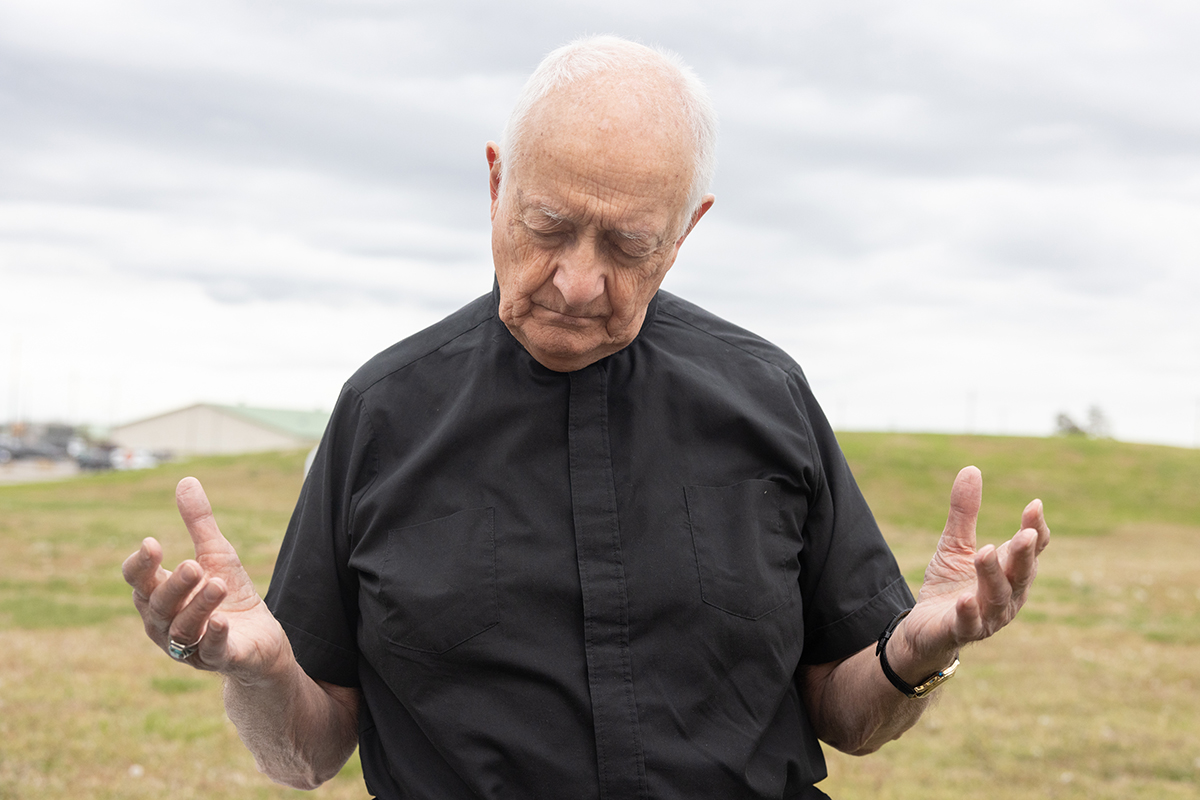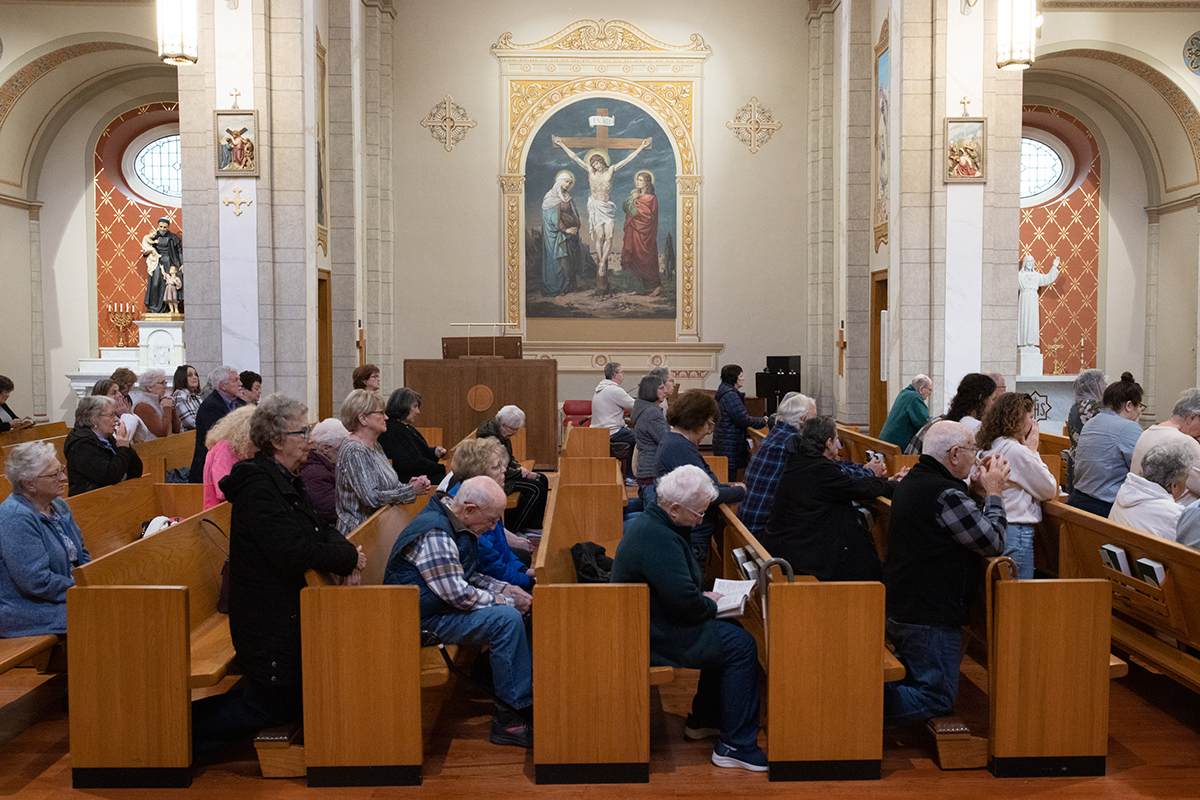Priests, deacons share varied perspectives about the sin of racism at Masses across the archdiocese
In response to an invitation from Archbishop Carlson, priests and deacons share their own words about the sin of racism with the congregations
Archbishop Robert J. Carlson invited clergy to preach about racism during Masses the first Sunday in Lent.
His request was “in response to the many challenges we have had since Ferguson (following a police shooting), and again this past summer and fall in the St. Louis area” following clashes between pacifists, protesters and white supremacists in Charlottesville,Va., and the not-guilty verdict in the trial of a former St. Louis police officer charged with first-degree murder in a shooting death in 2011.
“I realize racism expresses itself in many different ways and when many hear the word they immediately think of policies, institutions, laws, and language,” Archbishop Carlson wrote. “It is certainly part of our history here in Missouri and is found in the social structures that make up society.
“During the 1960s we made many laws as a nation against racism, and some things changed. But we never took the time, as a people, to really talk to one another about this issue, and a deep divide has remained. All people, regardless of race, should be treated with dignity and respect. All children, no matter where they reside, should feel safe in their environment and should benefit from quality education without having to travel out of their neighborhood to receive this benefit. We must do better.”
Here’s how some priests and deacons addressed the issue.
Father Peter Fonseca, associate pastor of Queen of All Saints Parish in Oakville.
In considering the issue, think about the dignity of the human person. “Ultimately we’re no different. We may have different backgrounds, different liturgical differences, but we’re the same people. … At the core everyone wants the same thing — everyone wants to love and be loved. Everyone wants to be accepted,” he said.
He reflected on growing up in west St. Louis County and having no familiarity with north St. Louis before serving as a seminarian at a primarily African-American parish, St. Elizabeth Mother of John the Baptist Parish. “In many ways it seemed like traveling to a new world. But as you start to meet people, you realize deep down there really are no differences. Maybe things appear different, but the challenge is not to live your life on appearances but rather on engaging and realizing deep down there are no differences.”
Father Carl Scheble, pastor of St. John the Baptist Parish in south St. Louis and dean of the South City Deanery.
Being pastor of a mostly African-American community in north St. Louis “broadened my vision and opened my heart more, helping me understand the community more and some of their pains and sorrows” as well as their gifts.
Black Catholics at one time had to sit in the back of church and receive Communion last. He cited a priest in the Diocese of Wichita, Kan., who wasn’t allowed to become a priest in the St. Louis Archdiocese because at the time Cardinal Joseph Glennon didn’t allow African Americans to be ordained here. “He had to shop around for another diocese.”
Instead of debating whether or not someone is racist, Father Scheble prefers to ask people to just open their hearts more to others.
Father Art Cavitt, pastor of St. Nicholas Parish in north St. Louis and executive director of the St. Charles Lwanga Center.
Drawing inspiration from the Gospel message of Jesus going to the desert and being tempted by Satan, there is likewise a temptation for African Americans to fall prey to a feeling of inferiority — which is all a lie designed by Satan himself.
“God has given us the power to look beyond (racism). It is systemic and the individuals perpetuating it. We have the power of kicking away Satan and the internalization, and to not become the stereotype.”
Even Jesus wasn’t immune to the encounter of temptation. “He, too, was ministered to. We are ministering to each other, and the Church is ministering too, in order to bring us forward.”
Father Brian Fallon, parochial administrator of St. Elizabeth of Hungary Parish in Crestwood.
Last month, on the weekend of the Dr. Martin Luther King Jr. holiday. Father Fallon asked members of the congregation where they went to high school, well-known as a unique St. Louis inquiry of new acquaintances.
People define others by the answers to the question — making assumptions about them. Impressions differ whether someone says they went to Visitation or Vashon high school, for example. Likewise, people make judgments based on “what part of town we live in, the clothing we wear” and more. “Sometimes snap judgments are made about people based on what they look like or the color of our skin.”
Jesus “asks us to look past the easy stereotypes” and look to the heart of people.
Some people may wonder what Crestwood, for example, may have to do with a city such as Ferguson. But, “as the body of Christ, all of us are connected. We have pride in the city and who we are as followers of Jesus and (must consider) how we can join together.”
Father William Dotson, parochial administrator of St. Charles Borromeo Parish in St. Charles.
Racism is contrary to our faith. “We all know that God created each and every human being with an inviolable dignity, and that racism is a sin because it attacks that dignity.”
Most people who hear the word “racism,” think of extreme examples such as the Ku Klux Klan or Neo-Nazis. But there are subtler forms of racism.
Confronting racism starts within. Racism “comes out in many different ways, some more explicit, some more covert. It shows itself in comments made about people of different races or about other countries and nationalities. It shows itself in the many ways that we treat people differently because of their race.” While it is uncomfortable to admit having subconscious racist thoughts, “when we are uncomfortable, we can grow. When we allow the Holy Spirit to make us uncomfortable, He can do amazing things in our lives.”
Father Bill Kempf, pastor of St. Justin Martyr Parish in Sunset Hills.
Father Kempf shared a story about a scenario he and several classmates went through during their priestly formation. In the make-believe scenario, each group was given a lifeboat and told that one person had to leave the boat or everyone dies. No one was allowed to volunteer to get off the boat, and all had to justify why their life was worth staying. Like all human beings “I matter, not because of the color of my skin, nor because of my skills or talents or education or the opportunity that I was afforded — but simply and only because I am God’s own,” he reflected.
“That is where the Church starts her teaching, not just about the sanctity of life, but in every discussion we are called to have about race and privilege and equality. My life matters no more or no less than any other life on this planet.”
Though we are all created equal, not all are treated as such. He’s seen that first hand, moving from St. Ann Parish in Normandy, where the Normandy School District was one of the worst performing in the state; to St. Justin Martyr, which sits in the Lindbergh School District, one of the best public districts in the state. The majority of Normandy’s students are black, while the majority of Lindbergh’s students are white.
“That is the racism I believe we need to confront. Not that person ‘X’ treats person ‘Y’ in a way that demeans and belittles them because they have a different pigment in their skin (though that too, is it’s own serious issue) — but the structures that keep people trapped in a cycle of poverty and inequality.” Some concrete actions for tackling the problem of racism include looking for their own “lifeboat moments,” participating in the parish’s Lenten conversations on racism and reading the Ferguson Report.
Father Robert Rosebrough, pastor of Blessed Teresa of Calcutta Parish in Ferguson.
Father “Rosy” said he often fields the question: “How is Ferguson doing?” Rather than just responding, he opts to take a more inclusive direction, asking in turn, “How is facing racism doing in your parish and your community?”
The point is to help people understand that racism isn’t just related to the events that have happened in Ferguson. Racism is an issue for everyone to address.
For more than three years, the parish has had a front seat to the discussion on racism; he acknowledged that it is a long journey to face the roots of racism in ourselves, families, communities, nation and within the Church.
“I am proud of our parish as we have said ‘yes’ to Jesus leaning in our hearts to become the persons Jesus years and desires us to be. Because of our notoriety across the nation and the world, we are called to be seeds of hope on the journey of facing racism head-on.”
Msgr. Mike Turek, pastor of Christ the King Parish in University City.
Connecting racism to the Scripture reading of Jesus entering the wilderness, we, too, enter into a spiritual wilderness because of issues such as violence, blatant disregard for life, lack of virtue, lack of confidence in government systems and elected officials and a sense of powerlessness. Lent is a good time to clear our heads and make room for truth, wisdom, holiness, peace, justice and love as priorities.
We need a source of wisdom and holiness to break through the shallow way of thinking that often operates within ourselves and our communities. We must listen and respond to Jesus’ call that the kingdom of God is at hand — and to repent and believe in the Gospel.
Deacon Sam Lee, permanent deacon of All Souls Parish in Overland.
There is an analogy between the topics of abortion and racism. Both abortion and racism are sins, and not participating in either isn’t good enough.
Deacon Lee, who for decades has worked as a pro-life lobbyist in Jefferson City, noted that with the sin of abortion, we know we are called to do more, such as contacting elected officials to urge them to pass pro-life laws, or supporting alternatives to abortion through agencies like Catholic Charities, Birthright and Our Lady’s Inn.
Similarly, with racism, “the Church is asking us to not just directly avoid committing acts of racism, but to oppose — even fight if necessary — racism committed by others. That includes discrimination performed by both individuals and institutions.”
Father John O’Brien, pastor of Our Lady of Guadalupe Parish in Ferguson.
Fear lives among us for many reasons, including changing demographics and shifting populations, racial profiling, overt xenophobia and injustices, including in our laws and in the workplace, for example.
We must repent, by naming our fears and renouncing them in Jesus’ name. He also called on others to renounce the obstacles presented within ourselves and the Church that keep us from proclaiming a “kingdom of justice and brotherhood.”
Father Kevin Schroeder, pastor of Incarnate Word Parish in Chesterfield.
Focusing on the spiritual component of the sin of racism reveals that racism is a product of original sin.
The priest admitted that the topic was difficult to preach on because it often leads to discussions that become politicized, manipulated, resulting in name calling and an “us-vs-them” mentality.
“Because racism is a spiritual problem and a moral evil, its remedy will be the same as other sins we struggle with. We cannot fix it by human efforts alone. … We need, as Christians, to make God part of the solution. Faith has to guide our thoughts, words and actions.”
Ending sin is much bigger than just changing laws. “It requires changing hearts.”
Father Tim Foy, pastor of St. John the Baptist “Gildehaus” in Villa Ridge.
“Jesus didn’t come for a bunch of stratified kingdoms of people separated from each other, but all bowing down before Him like slaves. Rather, He came to reveal a new Kingdom to which all are invited. We are not meant to segregate ourselves off whether in our neighborhoods or in our minds. And while we may agree with that in theory, we know we have further to grow as a people to live in perfect communion with one another.”
Father Mitch Doyen, pastor of Assumption Parish in O’Fallon.
After sharing a glimpse of his family genealogy, going back to France, Father Doyen asked the congregation to think about what it would have looked like if that genealogy included being a descendant of slaves.
“What if I knew that my great ancestors for hundreds of years were sold as property and families divided and scattered without names? Only a mark on their body, with the name of their owner?”
He encouraged the congregation to take steps toward healing the great wound of racism in our culture.
Having conversations with one another and seeing how others live differently from one another is critical to healing the wound. “We need to tell those stories.”
Archbishop Robert J. Carlson invited clergy to preach about racism during Masses the first Sunday in Lent. His request was “in response to the many challenges we have had since … Priests, deacons share varied perspectives about the sin of racism at Masses across the archdiocese
Subscribe to Read All St. Louis Review Stories
All readers receive 5 stories to read free per month. After that, readers will need to be logged in.
If you are currently receive the St. Louis Review at your home or office, please send your name and address (and subscriber id if you know it) to subscriptions@stlouisreview.com to get your login information.
If you are not currently a subscriber to the St. Louis Review, please contact subscriptions@stlouisreview.com for information on how to subscribe.






